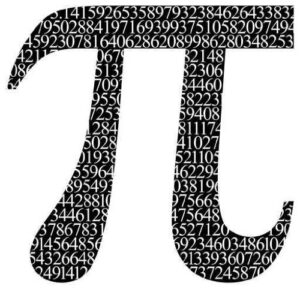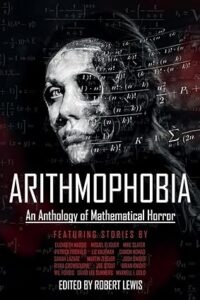Just in time for Pi Day, we have a special treat: David Simms reviews a brand new anthology of mathematical horror, Arithmophobia! Now that I think about it, I’m shocked that I haven’t seen more come my way: centuries ago poets were writing about “fearful symmetries”
Speaking of Pi Day, the Monster KId thought ahead and brought home a banana cream pie to celebrate. We’ll see how long it lasts.
Arithmophobia: An Anthology of Mathematical Horror edited by Robert Lewis
Polymath Press. 2024
ISBN-13 : 978-1961827042
Available: Paperback, KIndle edition
Buy: Bookshop.org | Amazon.com
Many people simply hear the word “math” and their anxiety spikes. Can you blame them? Just the thought of algebraic equations, functions, or those concepts that blend numbers, letters, words, and scientific terms often causes math-phobes to twitch, sweat, eyes to roll, and worse. Yet somehow, somewhere, there exist creatures who do enjoy this discipline. They find comfort in the numbers, patterns, and alchemy that math holds.
Some believe that the subject can conjure up darker solutions. No, it’s not calculus or the dreaded word problems on the SAT. Robert Lewis has collected some of the finest, fiendish minds to pen thirteen tales on this realm of academic hell, along with a poem to alleviate the fears of the triskadekaphobics out there. It’s not much of a comfort, except for those who find it in the numbers.
The stories within are worth the adventure, although some will be loved by those in love with mathematics more than those who fear it. Still, each one has some allure for various readers.
While this reviewer finds all things mathematical horrendous and spawned from the depths of Hades, that is a bias which yields some pleasures in this book. Four stories particularly stand out. Elizabeth Massie, a former science teacher, opens the anthology with “One Two, Buckle My Shoe”, a short, but effective opening story which discusses Janie, a woman stuck caring for her ailing mother. Her only escape is a part-time job at the dollar store, unless you count her love of numbers. It’s an obsession given to her by her mother, for reasons made clear as the story creeps by. Massie has a great skill in marrying the frightening with the absurd, which is on full display here.
“Manifold Thoughts”, written by physics teacher Patrick Freivald, creates math that communicates with the characters– and much more, something that is incomprehensible.
Sarah Lazarz’ wonderful “They’ll Say It Was the Communists” is likely the most intriguing of the lot, Its tone harkens back to the 20th century (the decade is unknown, but the protagonist, Leslie, works in an office building and payphones are still a thing). To rise up in the company, math problems must be solved – yet what’s on the other side? This one sticks.
“Trains Passing,” by Martin Zeigler, becomes the centerpiece, in a way. It’s the ultimate word problem. Those who have lingering nightmares about the SAT or other ignorant standardized tests will fall headfirst into this tale of a passenger dead set on solving the ultimate practical math problem. She’s joined by another, who happens to have her own reasons for solving the traveling train dilemma. This should make it onto the next big exam.
Overall, Arithmophobia is a fun, intriguing read that will remind the reader how terrible those math classes were– or inspire number lovers to keep swimming through formulas and equations that, hopefully, don’t lead to the dark solutions found between the covers of this book. .





Follow Us!